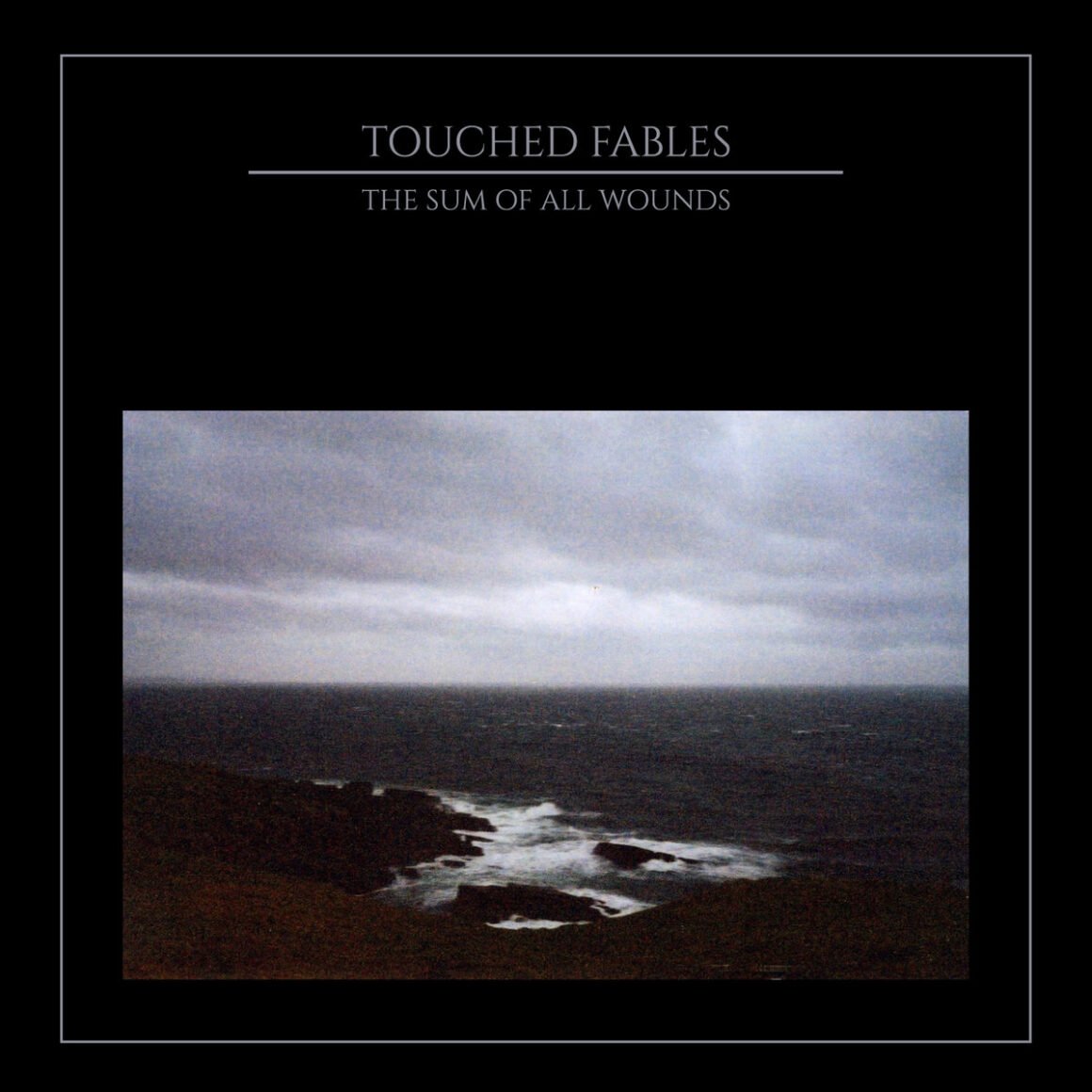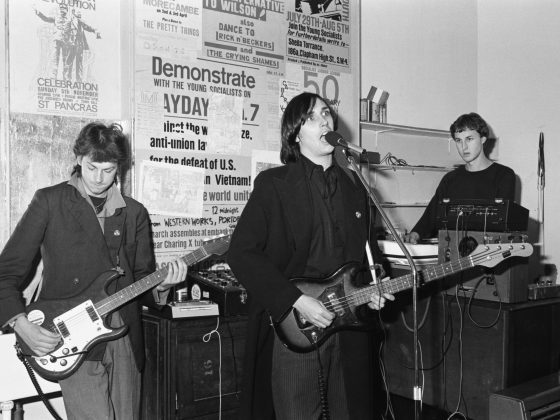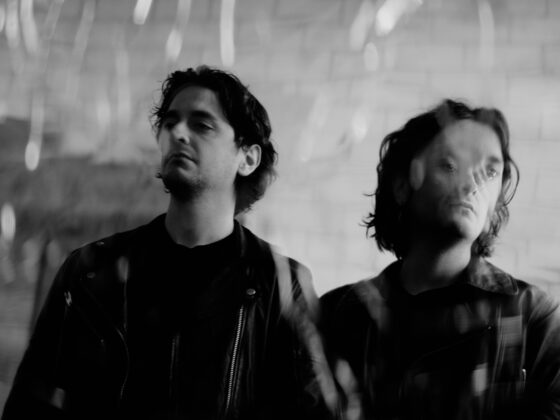Ottawa’s Touched Fables (Paul Anthony and Jim Roditis) write with the kind of precision one expects from those who have seen the architecture of despair up close. Formed in 2022, the duo mines the deep seams of post-punk and darkwave with an attention to structure, tone, and emotional economy that recalls the exactitude of early Ultravox and the metallic discipline of 80s industrial like SPK and Front Line Assembly. Their debut full-length, A Thousand Goodbyes, is a document of disquiet, a study in emotional erosion.
“We’re not only referencing classic post-punk bands, but we’re also mining the same territory as more contemporary acts like Twin Tribes and Drab Majesty,” says Anthony. “The harder sound on this album also helped me find my voice… I consciously tried to sing with more sustained tones compared to the last release—less clipped.” His admission hints at a technical evolution, but the outcome feels less like expansion and more like distillation: a purer, colder signal from the heart’s machinery.
A dirge turned confession, In Your Eyes peers into the emotional residue of betrayal and memory’s persistence. Its melody tilts uneasily, bending through unexpected key changes that evoke the vertigo of trying to love through distortion. Anthony’s delivery is both intimate and remote, his voice draped in a metallic hush, echoing through the ruins of what was once connection. The guitars shimmer like a failing signal, while the synths pulse with the fatal calm of resignation. It recalls the early Clan of Xymox aesthetic, yet the tension feels personal, almost forensic.
With Burning, the duo sharpen their industrial edge; the song is a study in guilt, desire, and the collapse of communication, a relationship set alight by its own deceit. Metallic percussion and serrated basslines grind against the gentler synth chords that rise in the chorus. The song’s architecture mirrors its emotional core: mechanical precision wrapped around human fracture. Channeling Front Line Assembly, PIG, and Skinny Puppy, the verses smolder with paranoia before erupting into a synthpop chorus that feels like the brief relief of confession.
A song of devotion built on decay, Cenotaph imagines remembrance as a form of imprisonment. The lyrics trace a lover’s image frozen in time, embalmed by obsession. Eerie synthesizers hum like power lines over an EBM rhythm that marches toward oblivion. The track’s tension lies in its contradictions: cold textures carrying deep reverence, and the worship of what has already died. There’s a glacial beauty to its detachment, something between Depeche Mode’s late-’80s darkness and Gary Numan’s industrial solemnity.
Elsewhere, A Thousand Goodbyes opens up into moments of stark beauty. With Sunlight Falls, the album exhales. It’s the quiet moment after grief’s loudest hour; a gentle surrender to impermanence. Built around ambient synth drones and soft percussive murmurs, the song captures the tender ache of a love that has already left the room. Anthony’s voice softens, almost fading into the arrangement, as if acceptance requires a loss of self. It’s less a lament than a sigh of understanding; grief observed from a respectful distance.
In Forever, yearning turns into ritual. The song moves like a heartbeat, its rhythm steady and searching. Glimpses of coldwave surf guitar punctuate the chorus, introducing a strange brightness that cuts through the gloom. It’s the sound of someone looking back at love with both affection and exhaustion. Forever dwells on the paradox of connection—the idea that something can end and still endure, looping endlessly through memory’s echo chamber.
Tears I Cannot Hide reads like an autopsy of desire, sifting through emotional residue: the guilt, the longing, the what-ifs. Unusual chord progressions pull the listener off balance, while Anthony’s voice floats between confession and calculation. The guitars ring out in mournful restraint. Beneath its beauty lies unease: the recognition that love’s remnants are often as corrosive as its absence.
Quiet and deliberate, What Could Have Been examines loss as something procedural. Synths pulse like fading lights, their repetition mirroring the obsessive cycle of regret. Anthony’s vocals are hushed, nearly spoken, as if recounting evidence from a dream he no longer trusts. It’s a mature, subdued meditation, less about heartbreak and more about the quiet acceptance that some stories end mid-sentence. The restraint is striking; it feels like the emotional still point of the album. Never Let Me Down occupies the space between devotion and doubt. The song builds its tension slowly, layering a subtle industrial hum beneath fragile vocals. The result is a portrait of trust unraveling by degrees. Channeling industrial-era Gary Numan, the duo use that mechanical template to explore something achingly human: the exhaustion of faith in another person.
A storm in form and function, Harsh Rain channels remorse through rhythm. The song’s EBM foundation gives it a percussive urgency, but the melody carries the solemn grace of a eulogy. Choral synths rise through the mix, transforming grief into something oddly communal, a ritual for the emotionally stranded. Danceable, yes, but never escapist; every beat feels like a pulse of remembered pain.
The album closes with Bird of Prey, a bilingual reflection on captivity and belief. Moving fluidly between English and French, Anthony uses the image of a caged blackbird to explore repression, beauty, and the frailty of faith. The guitar tone blurs toward shoegaze textures, thick and luminous, while his voice recedes like prayer. The song ends in a kind of suspended motion: neither despair nor deliverance, but something quieter: understanding.
Listen to The Sum of All Wounds below and order the album here.
Touched Fables build their world not through grand gestures but through precision and control. Every tone feels reasoned; every silence, intentional. A Thousand Goodbyes studies grief under a microscope, revealing its anatomy with analytical grace. The result is effective and exacting: a meditation on absence, rendered with the clarity of thought and form.
Just a week after Touched Fables celebrated the release of their debut album A Thousand Goodbyes, life imposed a sudden silence. A serious illness struck Roditis’s family, halting the band’s momentum overnight. “Any plans to play more shows were cut short, and weak immune systems meant staying home and avoiding large crowds. We obviously took a long break from music,” recalls Paul Anthony.
Months of uncertainty followed before the duo found their footing again. “Almost a year later, we were able to return to the stage and started working on new songs,” Anthony continues. “There was a huge turnout at our second gig, and I think our unintentional absence actually created some anticipation here in our hometown of Ottawa. Playing live was also a great way to test out new material…We took this knowledge back into the studio to fine-tune our new album, The Sum of All Wounds.”
For Roditis, that forced hiatus became a kind of recalibration. “The gap year gave us time to evaluate and plan where to go next,” he explains. “Those live shows were key. We realized we could write a mix of ‘listen-at-home’ tracks and others that really worked well on the dancefloor. Staying true to our premise that Touched Fables is the music we wish we could have made when we were younger, two years after our debut puts us around 1988, when early industrial records were emerging from Europe. The percussion on this album reflects that era, and the guitars are much more prominent and aggressive.”
Now back at full strength, the band is preparing a series of performances across Montreal, Toronto, Hamilton, and London, Ontario.
Follow Touched Fables:
















 Or via:
Or via: